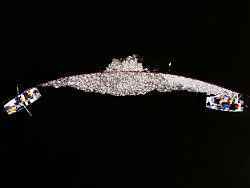criticism of later information
Lemke demands clarification from Poland about fish kills
08/14/2022, 7:00 p.m
It is still unclear what causes numerous fish in the Oder to die. Federal Environment Minister Lemke is requesting information from Poland. The fish kill was already known there in July – the fact that the knowledge was not passed on is not well received on the German side.
At the meeting with her Polish counterparts, Federal Environment Minister Steffi Lemke asked for clarification on the background to the fish kill in the Oder. The government of the neighboring country has already admitted that information about the environmental disaster had not been passed on within Poland either, the Greens politician told NDR. “This information reached us much later.”
The aim of the meeting must now be “to solve this crime”. She expects clarification on what water samples have been analyzed so far and what the cause of the damage could be. According to government information, Polish authorities had indications by the end of July that there were masses of dead fish floating in the river. The fact that this information was not passed on has already led to disagreements between Germany and Poland.
Lemke emphasized that the effects of the fish kill cannot be made up for. “Once such a catastrophe has occurred in a river, the damage is there and can only be limited.” The Polish government suspects that a huge amount of chemical waste may have been dumped into the Oder. The country has offered a reward of more than 200,000 euros to clarify the fish kill, which is rated as an environmental disaster.
Lemke will meet her counterpart Anna Moskwa and Poland’s Infrastructure Minister Andrzej Adamczyk in Szczecin. Brandenburg’s Environment Minister Axel Vogel from the Greens and the Environment Minister for Mecklenburg-Western Pomerania, Till Backhaus from the SPD, are also to take part in the meeting.
So far no fish carcasses in the Szczecin Lagoon
Brandenburg’s Prime Minister Dietmar Woidke calls for further investigations into the cause. On the fringes of the art award ceremony in Neuhardenberg, he said: “We must continue to work intensively to clarify what exactly happened. To this day we do not know which substances are involved.” The investigation must be carried out together with the Polish authorities. According to Woidke, laboratory results have been announced for Monday in Brandenburg. In addition, it annoys him “that it took so long for information to be available,” said Woidke. “We will then have to address this critically with the Polish side.”
According to the Ministry of the Environment in Mecklenburg-Western Pomerania, no fish carcasses have been discovered in the German part of the Szczecin Lagoon. “So far, the water police have not spotted any cadavers. Residents have not reported anything of the sort to us either. Nevertheless, we are still on the alert and are monitoring the situation on site very closely,” said State Minister Backhaus in Schwerin.
Samples taken on Saturday reportedly returned normal pH, oxygen and conductivity readings. However, according to the information, the investigation for pollutants is not yet complete and could take several days. The samples are taken at three measuring points, including near Ueckermünde and near the German-Polish border. As early as Saturday, the state ministry recommended that residents refrain from fishing in and taking water from the water for the time being.
